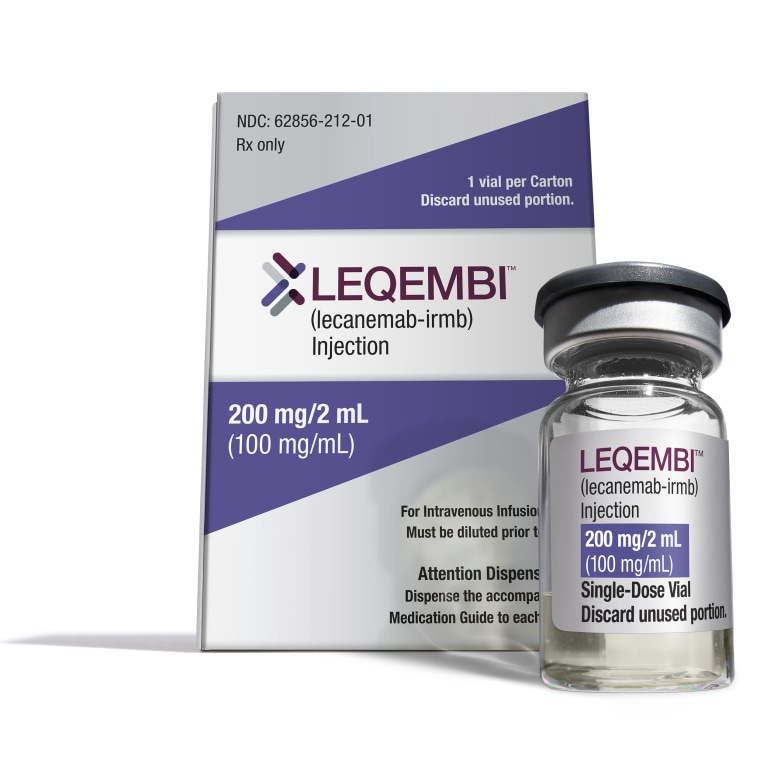
The Food and Drug Administration on Friday approved an Alzheimer’s drug shown in clinical trials to slow cognitive decline in patients in the early stages of the illness.
The approval offers patients renewed hope after repeated failures to find effective treatments, even though there have been reports of side effects with the new drug, experts say.
The drug, lecanemab, which will be sold under the name Leqembi, is a monoclonal antibody infusion given every two weeks.
The FDA approved Leqembi for use in people with mild cognitive impairment or early Alzheimer’s disease.
The drug was approved in an accelerated pathway, which allows early approval for promising new medications that “fill an unmet medical need.” At the same time, companies are required to conduct additional clinical trials to confirm the benefits of their drugs or risk their removal from the market.
The agency said its decision was based on a phase 3 clinical trial of 1,795 patients, which found the drug, developed by drugmakers Eisai and Biogen, slowed cognitive decline in people who received it by 27% after 18 months.
The FDA did not seek the advice of its advisory committee — which it did do before it controversially approved another Alzheimer’s drug developed by Biogen, called Aduhelm, in 2021.

Leqembi is not a cure; it aims to slow the progression of the disease by removing clumps of beta-amyloid — long thought by scientists to be one of the main causes of the disease — from the brain.
The benefit is small, experts say, but added anything that might give patients additional time with family and other loved ones is valuable.
The biweekly medication is expected to cost around $25,000 annually for a single patient, Ivan Cheung, the U.S. chairman and CEO of Eisai, told NBC News. The Centers for Medicare & Medicaid Services currently limits coverage of drugs that target amyloid in the brain, so uptake of the new medication may be limited at first, Cheung said.
Safety concerns have been raised about the drug. At least three deaths may be linked to the medication after the patients experienced brain swelling or brain bleeding.
According to the company’s phase 3 trial data, about 12.6 % of patients who received the medication experienced brain swelling, compared with just 1.7% of those in the placebo group. About 17% of patients who received the drug experienced brain bleeding, compared with 9% in the placebo group.
Cheung said the company is still “confident” that the benefits of the drug outweigh its risks.
“The disease is devastating,” he said, “and comes with a lot of emotional turmoil on all families involved.”
Alzheimer’s is the seventh-leading cause of death in the U.S., according to the Centers for Disease Control and Prevention. Most drugs approved by the FDA for Alzheimer’s are aimed at helping symptoms, not actually slowing the progression of the disease.
Friday’s announcement comes on the heels of a scathing congressional report released last week detailing the approval of a different Alzheimer’s drug, called Aduhelm. That drug, developed by Biogen, was approved in 2021 despite an FDA advisory committee’s finding that it was unlikely to work. In last week’s report, investigators said that the agency failed to adhere to its own standards and that its approval of Aduhelm was “rife with irregularities.”
In response to the report, Public Citizen, an advocacy group, sent a letter Wednesday urging the FDA to postpone its decision on whether to approve Leqembi while the companies finish the additional clinical trials needed for full approval.
The drug does have defenders.
Donna Wilcock, the assistant dean of biomedicine at the University of Kentucky, said Leqembi should be approved. The data supporting Leqembi’s application is “robust,” she said, adding the results of the trial are the best she has “ever seen for an Alzheimer’s drug in my 25 years.”
The Alzheimer’s Association has said that based on the Eisai and Biogen phase 3 clinical trial results, the FDA should approve Leqembi for early-stage Alzheimer’s.
The organization is urging the Centers for Medicare & Medicaid Services to reconsider its decision on new Alzheimer’s treatments. Last year, in response to the poor data supporting Aduhelm’s approval, the CMS said it wouldn’t cover Alzheimer’s drugs that target amyloid unless patients are in a clinical trial.
Making the drug more widely available could mean more patients have “many months more of recognizing their spouse, children and grandchildren,” said Maria Carrillo, the chief science officer for the Alzheimer’s Association.
In a statement released after the FDA’s approval Friday, the CMS suggested that it may revise its position on coverage of certain Alzheimer’s treatments.
“CMS is examining available information and may reconsider its current coverage based on this review,” the agency said.
Follow NBC HEALTH on Twitter & Facebook.
 Latest Breaking News Online News Portal
Latest Breaking News Online News Portal






